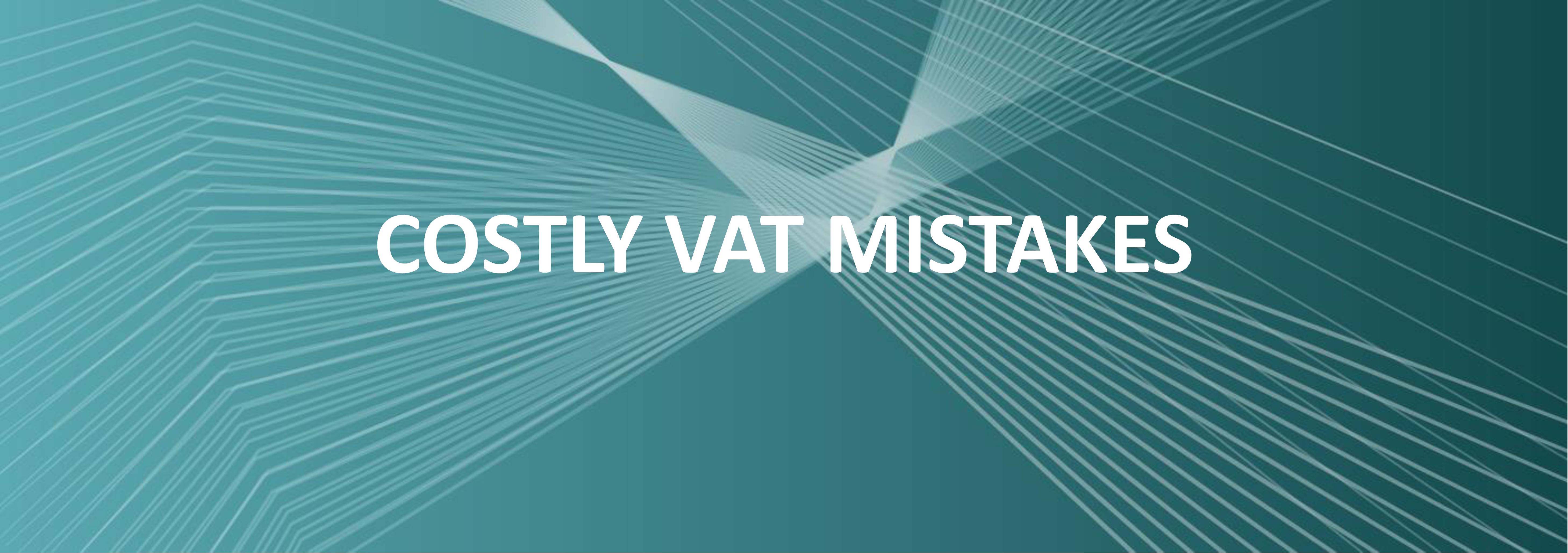- COSTLY VAT MISTAKES

COSTLY VAT MISTAKES
A value-added tax (VAT) is a consumption tax that taxes the value added by business operators at each point in the value chain. VAT exists in over 165
countries in the world and currently raises about one-fifth of global tax revenues. Whilst VAT is by design generally borne by the end consumers, the responsibility for collecting VAT on behalf of tax authorities lies with businesses making taxable supplies. VAT mistakes often occur with potentially damaging impact on businesses’ profitability, cash flow and reputation.
Not claiming recoverable input VAT
VAT paid on procurements are generally recoverable by business entities. Attention should be paid on ensuring that all supply transactions are appropriately processed and that all recoverable VAT are properly accounted for. With the standard rate of VAT in most major economies typically ranging from 15% to 25%, failure to correctly identify, record and claim recoverable VAT may have considerable adverse impact on cash flows as well as on profitability.
Not keeping adequate documentary evidence to support VAT claims
Failure to keep documentary evidence acceptable to the tax authorities may jeopardise the possibility of recovering VAT, as well as potentially lead to
additional costs. The documentary evidence would need to contain correct business details, corroborate the costs and expenses incurred, while proforma invoices are generally not acceptable.
Claiming input VAT on procurements not subject to VAT
Input VAT cannot be claimed on procurements that have not been subject to VAT. Care should be taken not to record VAT on procurements from suppliers that are not registered for VAT and on which no VAT has been charged.
Confusing exempt supplies with zero-rated supplies
Many businesses fail to differentiate between exempt supplies and zerorated supplies. Businesses making zero-rated supplies would generally be able to recover the input tax in relation to those products. However, the input tax suffered in making exempt supplies is irrecoverable and would directly increase the cost of those products, adversely impacting on the profit margin unless the VAT component is able to be passed on to customers. To avoid any miscalculation in the costing of products, as well as to reduce the risk of penalties in relation to the VAT return, zero-rated supplies should be recorded differently from exempt supplies.
Charging the wrong VAT rate on sales
VAT should normally be charged at the standard rate unless the supply is liable to be taxed at another rate, or is zero-rated, or is exempt from VAT. Charging the wrong VAT rate may lead to costly penalties in addition to possible adverse impact on customer relationships. For many product categories, the determination of the proper product classification for VAT purposes can be a complicated area, and there is a need to carefully examine the tax determinations and relevant case laws.
Failure to exclude non-deductible VAT
VAT on some specific categories of purchases (such as on several types of business entertainment) may be non-recoverable. Furthermore, it is important to appropriately apportion any non-business use element of expenses and to exclude them from the amount claimable. What can be claimed and the method of apportionment can be a complex and evolving area.
Entering the wrong amount
VAT authorities, as part of their audit, often match the purchase and sale invoices of various businesses. Mistakes such as entering the wrong amount
may not only result in a fine but also trigger a more extensive VAT investigation.
Time of supply
The point in time when products are deemed to be have been supplied would determine the turnover calculation for VAT registration purposes, whether and in which period input tax may be deducted, the period to which exempt and non-exempt supplies are allocated for partial exemption purposes, and the due dates for the remittance of VAT. The nature of customers’ deposits received, as well as the periods when payments are made and VAT invoices raised would need to be carefully examined. Furthermore, the identification of the time of supply for goods and services may also be based on different premises. VAT must generally be accounted for in the VAT period in which the time of supply occurs and at the rate of VAT prevailing at that time.
Place of supply and cross-border transactions
The place of supply is where a transaction is considered to have occurred for VAT purposes. Some countries have explicit place of supply rules in their VAT legislation to determine the jurisdiction where the VAT is payable. Place of supply may be determined differently for goods and services, and basic rules of supply may be overridden by special rules depending on the nature of the transaction involved. Businesses need to be aware of the various place of supply rules as well as any additional reporting requirements.
Mitigating risks in relation to VAT
VAT mistakes may adversely affect businesses’ profitability and reputation, as well as lead to business decisions based on incorrect information. Penalties associated with VAT mistakes may be significant and in some cases may involve criminal prosecutions. To limit risks in relation to VAT, it is strongly recommended that business operators have access to experienced and qualified professionals both well-versed in business procedures and up-to-date with developments in VAT laws.
DTOS provides valuable insights and value-added services to businesses with regard to their evolving present and future needs. Should you have any query in relation to the topic covered and require any assistance, please do not hesitate to contact us. We shall be pleased to assist you.

